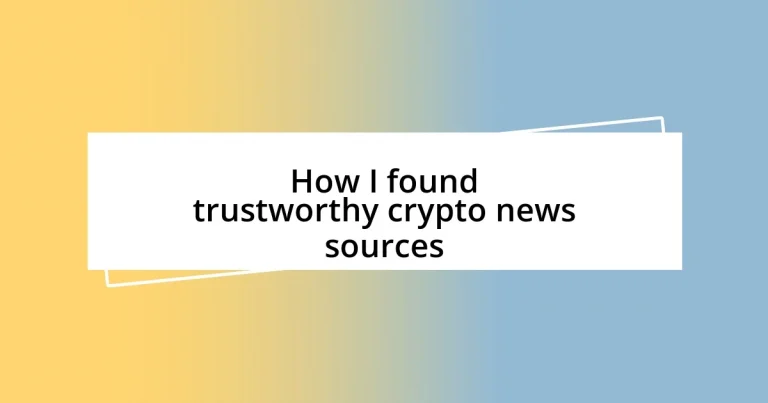Key takeaways:
- Reliable news sources are crucial in the volatile crypto market, as they influence investment decisions and risk understanding.
- Evaluating news credibility involves checking author qualifications, source reputation, transparency, and cross-referencing information.
- Community feedback and expert opinions play significant roles in identifying trustworthy sources and enhancing information credibility in the crypto space.
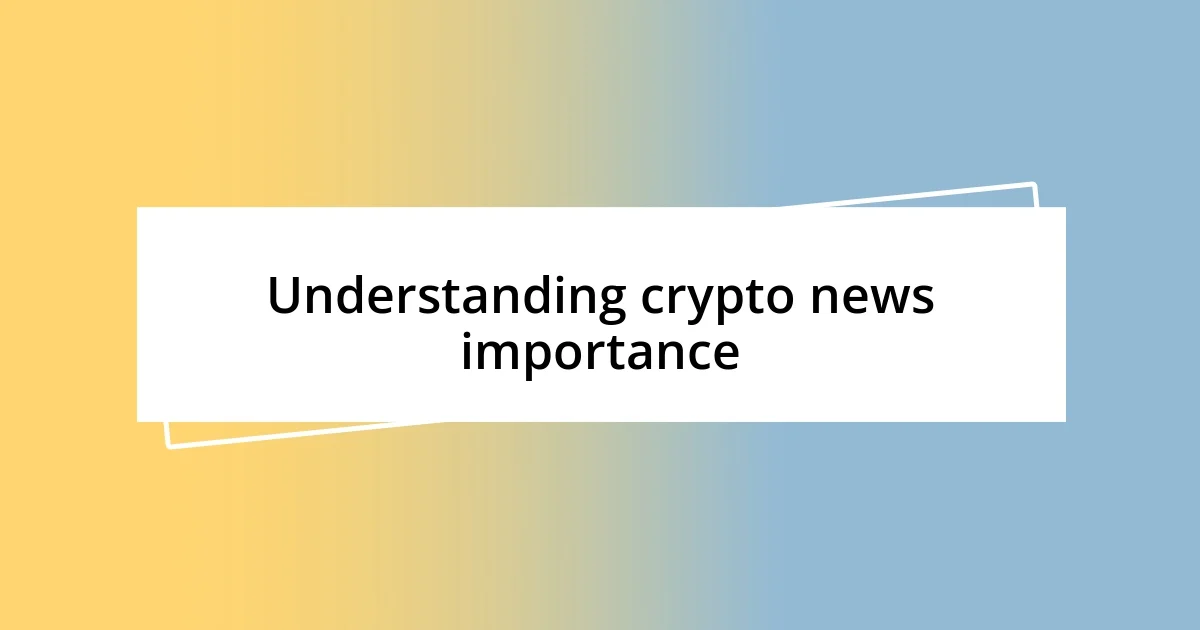
Understanding crypto news importance
When I first dipped my toes into the crypto world, I quickly realized how crucial reliable news sources were to my financial decisions. It felt overwhelming at times—like being in a maze where news could easily lead me astray. What’s the point of investing if you can’t trust the information guiding your choices?
I remember the day I acted on a rumor from a sketchy forum. It was exhilarating, but then reality hit when I lost money, leaving me questioning everything. That experience made me acutely aware of how influential accurate information is in shaping my trading strategies. In a market as unpredictable as cryptocurrency, good news can be the difference between profit and loss.
Trustworthy news gives you the confidence to act, but it can also shape your understanding of market trends and potential risks. For example, learning to differentiate between fear-based headlines and factual reporting transformed my approach to investment. So, how can we cultivate discernment in our sources? It takes time, but with a little effort, we can navigate through the noise and find gold amid the clutter.
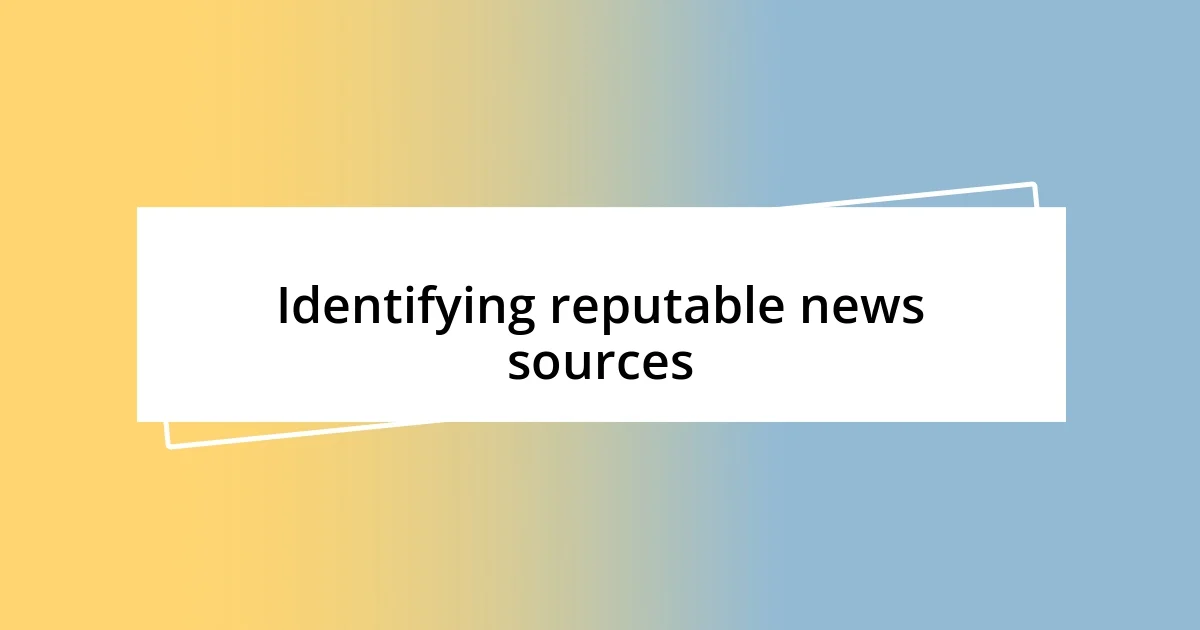
Identifying reputable news sources
When searching for reputable crypto news sources, I learned to look beyond flashy headlines and sensational claims. It’s essential to evaluate the credibility of publications and their authors. I often find it helpful to look for signs of experience in the writers’ backgrounds—do they have a history in finance or technology? When I discovered an article written by a journalist with years in economic reporting, I immediately felt more confident in the information presented.
Here are some indicators I consider when reviewing news sources:
- Author Qualifications: Check if the writer has relevant experience in finance or technology.
- Source Reputation: Look for established publications known for fact-checking and integrity.
- Editorial Transparency: Reliable sources often provide information about their editorial process and corrections policy.
- Citations and References: Trustworthy articles usually link to original sources or research data.
- Engagement with the Community: See if the outlet interacts with its readers and considers their feedback.
These steps keep me grounded and prevent me from getting swept up in the next big crypto story. It’s a bit like building a foundation for a house; strong and reliable sources support your decision-making process beautifully.
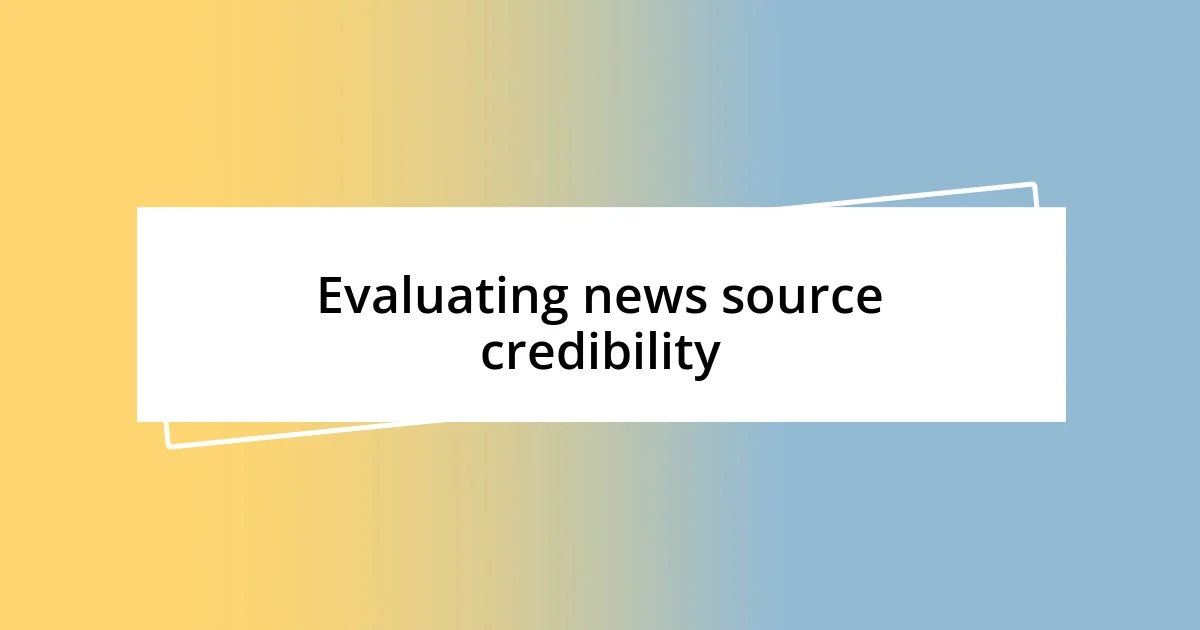
Evaluating news source credibility
When evaluating the credibility of news sources, I often turn to a few practical strategies that have served me well over the years. One method I find particularly helpful is checking multiple sources to confirm the same information. I vividly recall a time when headlines about a sudden market dip popped up everywhere, but after digging deeper, I discovered that only one dubious outlet was reporting it. That moment taught me the value of cross-referencing information—it’s crucial to avoid falling for sensationalized stories that lack a solid basis.
Another aspect I look into is the track record of a publication. If a news source has consistently provided accurate and insightful analysis over time, it likely deserves my attention. I still remember when I stumbled upon a crypto news website with a series of right-on-the-mark predictions. Their consistency not only built my trust but also guided my investments wisely. It’s not just about that one article; it’s about how a source performs over the long haul.
Lastly, being aware of potential biases is vital in this sector. I’ve caught myself sometimes reading articles that reflect my own preferences—it’s easy to do! Acknowledging one’s inherent bias is a powerful step towards seeking a well-rounded perspective. I always remind myself to evaluate whether a source has sponsored content or presents a one-sided argument, as this can skew my understanding of the market dynamics.
| Evaluation Criteria | What to Look For |
|---|---|
| Author Experience | Check for qualifications in finance or tech |
| Publication Track Record | Look for a history of reliable reporting |
| Source Transparency | Assess editorial policies and correction practices |
| Community Engagement | Evaluate how sources interact with readers |
| Information Cross-Verification | Confirm details through multiple credible outlets |
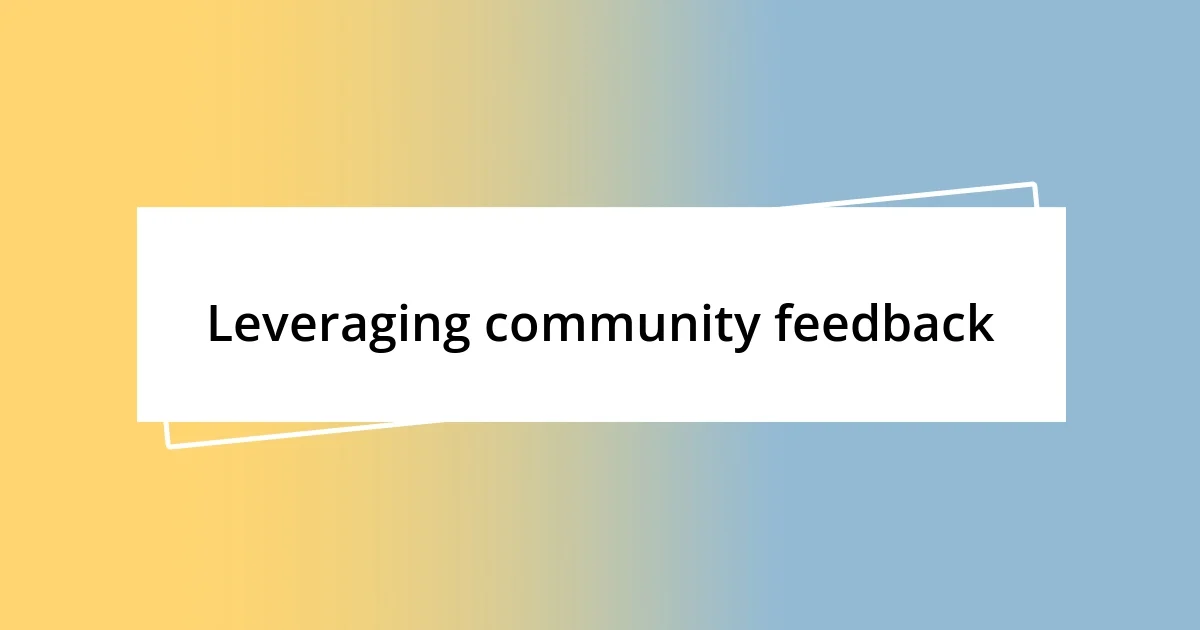
Leveraging community feedback
When it comes to leveraging community feedback, I often find that listening to the voices of fellow crypto enthusiasts is invaluable. One time, I stumbled across a forum where users discussed various news sources, sharing their experiences—both good and bad. This collective feedback opened my eyes to sources I hadn’t even considered, and I felt reassured by knowing others had already vetted them. Doesn’t it feel great to benefit from the research and experiences of others?
I’ve also noticed that active engagement with readers can serve as a litmus test for a news source’s transparency and reliability. For instance, there was a particular website that not only published articles but also took time to respond to commenters’ questions. Much to my delight, they addressed concerns and even adjusted their reporting based on community insights. It created a sense of trust that I now seek in other sources. Isn’t that a refreshing approach in an industry often steeped in uncertainty?
Another aspect I pay attention to is the sentiment expressed in the community feedback. I remember reading through a social media thread that examined a recent piece on a major cryptocurrency update. While the publication enjoyed a solid reputation, the community’s reaction was mixed. Some users pointed out factual inaccuracies, prompting me to dig deeper before taking their report at face value. This experience reinforced my belief that community conversations are often a treasure trove of insights. Don’t you think it’s essential to stay connected with those who are in the trenches alongside you?

Utilizing social media insights
Social media can be a goldmine for uncovering trustworthy crypto news sources. I remember scrolling through Twitter one evening when a thread exploded with insights about an upcoming regulation that could affect the market. Users shared not just rumors but links to reputable news articles and regulatory announcements. It struck me how quickly information travels among crypto enthusiasts, making social media a platform where real-time updates are shared and discussed. Isn’t it fascinating how a community can amplify the truth in such a fast-paced environment?
While hunting for reliable news, I find that observing the tone and content of posts can reveal a lot. For example, I came across a Facebook group dedicated to cryptocurrency news that seemed to have an enthusiastic yet critical approach to reporting. Members frequently challenged each other on sources and accuracy, sparking in-depth discussions. This dynamic interaction not only kept the information flowing but also fostered an atmosphere where accountability thrived. Have you ever noticed how the community’s scrutiny can enhance the credibility of information?
Moreover, I often take note of which voices consistently pop up in discussions about breaking news. There was a phase when a particular influencer shared insights about major market movements that caught my attention. While many were quick to praise them, I realized that their perspective was backed by clear analytical reasoning and historical context. This approach not only educated me but also motivated me to follow their recommendations closely. It’s incredible how social media can bridge the gap between expert knowledge and everyday investors like us, don’t you think?
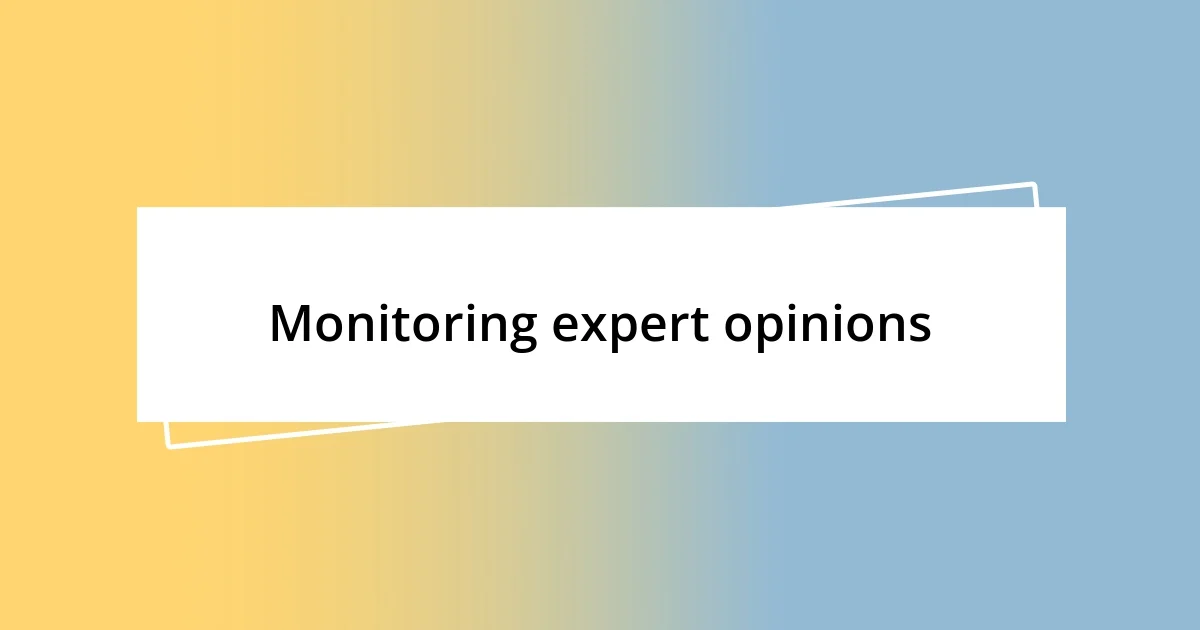
Monitoring expert opinions
I love diving into expert opinions because they often serve as the compass in my crypto journey. One time, I tuned into a podcast featuring a well-respected analyst discussing market trends—his insights were both enlightening and practical. Hearing him break down complex concepts with real-world examples not only boosted my confidence but also sparked my curiosity to research the topics he covered. Have you ever felt a real “aha” moment while listening to someone who just gets it?
Monitoring expert opinions doesn’t stop at simply listening; I frequently check their track records and how they’ve responded to volatile market conditions. There’s this seasoned investor I follow who faced criticism for his bearish outlook during a bull run. Instead of ignoring the noise, he engaged with his audience transparently, explaining his rationale with data. That kind of accountability resonates with me; it’s a reminder that true expertise often comes with the courage to stand firm, even when the market is euphoric. Isn’t it reassuring to find experts who practice what they preach?
Moreover, I’ve learned that the consistency of expert opinions is key. I recall following an analyst who made bold predictions, but over time, I noticed a pattern of inaccuracies that made me second-guess his insights. Trust is built on a foundation of reliability, and when experts waver, I don’t hesitate to reassess their credibility. Have you ever been burned by following someone who seemed knowledgeable but turned out to be unreliable? It’s those moments that remind us to tread carefully in our quest for trustworthy information.












